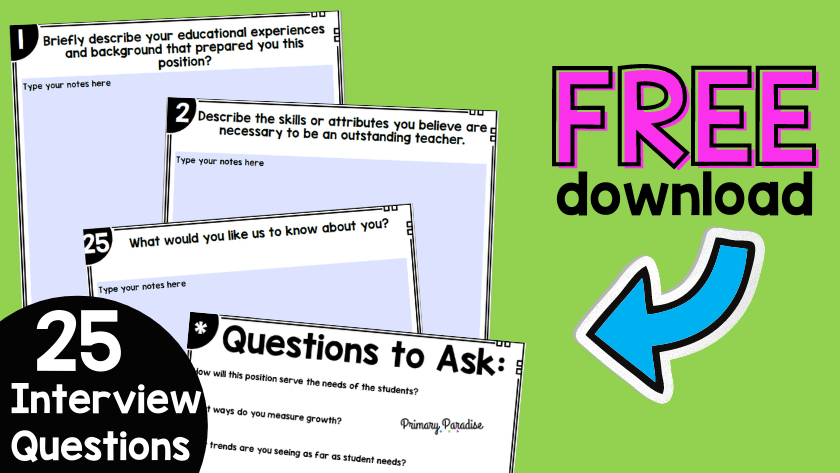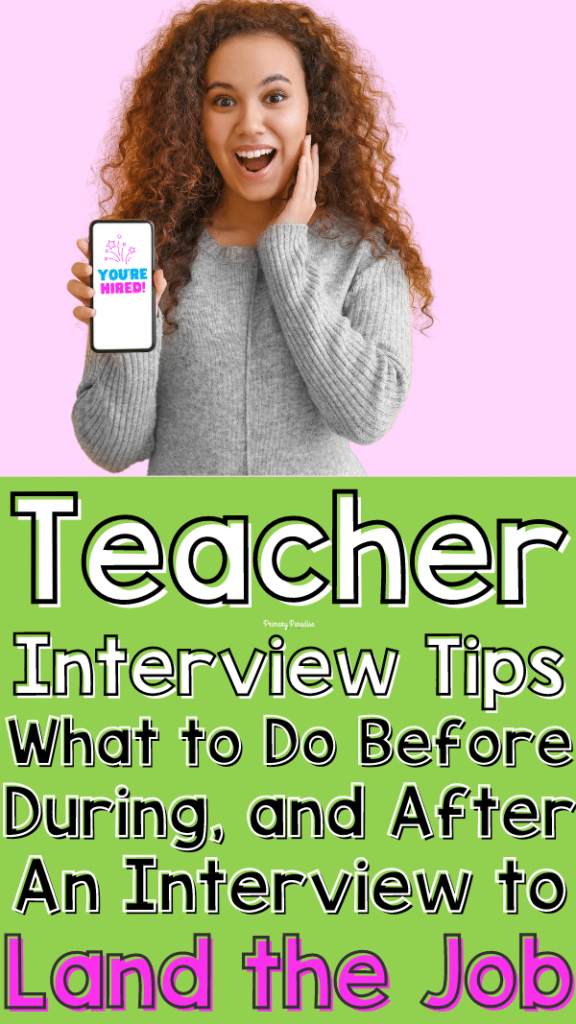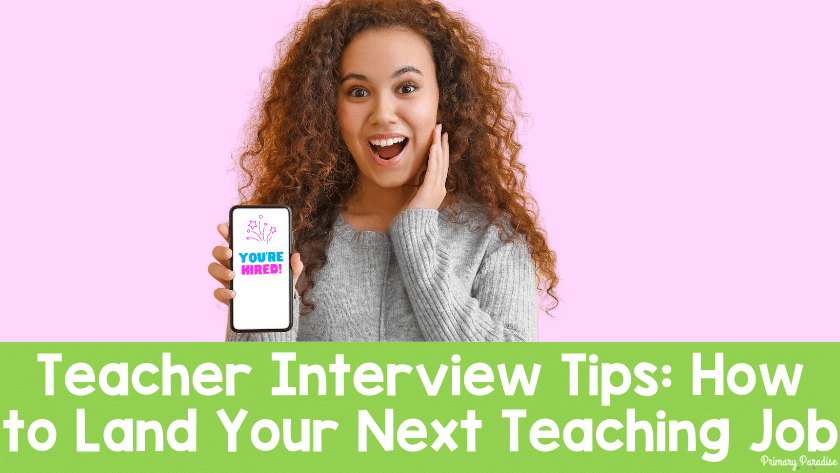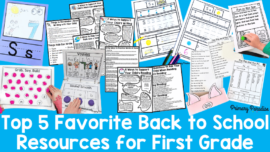Interviewing for teaching jobs can feel overwhelming and stressful. Unfortunately, if you don’t interview well, you’re unlikely to get the job. Whether it’s your first teaching job, second, or fifth, you can do a few simple things that will make all the difference. If you take the time to prepare, speak clearly, and follow some simple etiquette, that teaching job will be yours. Here are the biggest tips for teacher interviews for what to do before, during, and after the interview.
Before the Interview
So, you’ve sent in a resume and cover letter for your dream teaching job (or maybe just a teaching job), and you get the call. They want to interview you! Yay! Sometimes just getting an interview is hard, so you should feel really proud. But, before you walk into that interview, there are 5 things you want to do first.
5 Things to Do Before A Teacher Interview
1. Research the School
Before you step foot into a school for an interview, it’s very important to take some time to learn about the school. What they’re looking for in a teacher will depend a lot of the school’s mission statement, culture, and set up. (Actually, you really want to research the school before you send in your application so you can tailor your cover letter to the school.)
So, where do you start? It’s actually pretty simple. Head over to the school’s website and browse around. Look at the school’s mission statement and see how your experience and beliefs align with the schools. After browsing around the school’s website, you might get a decent sense of the school, but some school websites don’t share much. In addition to the mission statement, look for a calendar of events. This will show you what kinds of activities take place at the school. You can also look for any information on the curriculum that the school uses. Make note of any programs that you have experience with. If there are teacher websites aimed at students and parents, those are great to browse as well. They will likely give you a feel for what is happening in the classrooms.
Often, schools, principals, and teachers have Twitter and Facebook feeds that you can check out as well. Sometimes these are linked on the school website, and sometimes they’ll come up with a quick google search such as “Happy Elementary School Twitter” or “Jan Smith Principal Twitter”.
Lastly, you can quickly Google the name of the school and see what comes up. There might be some local news articles on special events at the school. This can also alert you to any issues the school has had in the past.
Take 30-60 minutes to learn more about the school can be incredibly helpful as you prepare. You’ll know how your abilities and knowledge align with the school. It can also provide you with information about the people you’ll be interviewing with. With a little effort, you can find some helpful and valuable information.
2. Prepare Answers for Common Questions
You can never know exactly what questions you’ll be asked during an interview, but you can prepare yourself with answers to the most common questions. (At the bottom of this post, I have a free resource with common interview questions to help you prep!) Once you have a list of common questions, come up with your answers to them. I recommend writing down a general outline of the points you want to make, and then here’s the important part, practice answering the questions out loud. It might feel silly, but practicing ahead of time can help you feel more comfortable with answering.
Common Teacher Interview Questions
Although, like I said, you can’t prepare for every question, there are certain questions that they almost always ask you such as “Tell us about your experience so far.”, “How do you handle behavior management?”, “Why do you want to work at our school?” (and your research into the school can really help you here!), and “How do you differentiate instruction?” In my last few interviews, I’ve been asked what I do in my spare time and to relieve stress, so having answers prepared for those questions are helpful as well.
One question that they often ask is “Why are you leaving your current school?”. In some cases, it’s cut and dry, but sometimes this question can be a minefield.
Maybe it’s a horrible work environment, or your principal is a nightmare. Maybe you cry on your way to and from school every day (hi, it’s me in my first teaching position). When you’re preparing for the answer to this question, it’s okay to be honest, but also diplomatic and maybe a bit vague. Whatever you say, do not badmouth your coworkers, administration, or the school. Instead, if the work environment is terrible, you can say something like “I’m looking for a school where I can be part of a team and collaborate with other dedicated teachers.” Or, if you’re just plan miserable, you can say, “I’m ready to move on and experience a new adventure at a new school.” The admin will likely get the gist without you saying something that could make you look bad.
Come Up With Specific Examples
When you’re preparing answers, think of specific examples to illustrate your points. That way you can show preciously how you can rise to that challenge. For example, if they ask you how you handle difficult parents, share an example of a time a parent had an issue and how you resolved it. Or, if they ask how you differentiate instruction, think of a really successful, differentiated lesson. Being about to share specific examples means a whole lot more than vague, general answers. It shows that you can put the strategies and skills you have in action and have positive results.
When you’re coming up with examples, it’s helpful if you can think of a few examples that illustrate multiple points. For example, if you had a student who was struggling with reading and therefore causing behavior issues, you could talk about how you built a relationship with the student, learned what they liked, and used that to help them improve their reading skills which helped with the behavior issues. This is particularly helpful because it means you have less things to remember.
Lastly, don’t be afraid to use examples that aren’t perfect. It’s okay to show that you are still learning and growing. It’s okay to say “I tried this, it didn’t work, so I tried something else.” The principal or administrator interviewing you don’t expect perfection.
3. Prepare your own questions to ask
Interviews go both ways. They’re interviewing you, and you should in turn be interviewing them. Before your interview, write down a few questions that you’d like to ask. Typically they ask what questions you have at the end of an interview. Normally a first interview isn’t the time to ask what the salary will be, but it is the time to ask things like “What makes this school special?”, “What is the most challenging part of working at this school?”, and “How does the administration support the teachers?” Make a list of 3-5 questions you’d like to ask, and bring them with you to the interview.
4. Have References Ready
If all goes well in the interview, they’ll likely ask for your references. Before you even step foot in the school, reach out to 2-4 people to ask if they’d be willing to be a reference. Typically, this involves giving the administration, or whoever you’re interviewing with, the person’s name, phone number, and email. They’ll contact them and ask some questions about you. Normally they ask for references in an email after the interview, but it’s always good to be prepared.
When you’re choosing who to give as your reference, there’s a few things to keep in mind. First, don’t pick a family member. This is pretty much an unspoken rule. Second, pick someone who knows you well and can attest to your abilities as a teacher and professional. If this isn’t your first teaching position, you can ask former administrators or teachers you’ve worked with. If you this is your first teaching position, you could ask a college professor, your student teaching supervisor, your cooperating teacher, or a boss or coworker from a non-teaching job. Mostly, they just want to know that you’re a hard worker, that you’ll show up on time, and you are a team player.
5. Dress professionally
Whether or not it should matter, what you wear to an interview is important. How you present yourself is the first thing your interviewer will notice, and people’s first impressions tend to impact how they see you. Although you can still be yourself, it’s important to dress professionally. When you’re choosing your interview outfit, take into account the weather, the fact that you’ll be sitting for a long time, and how you want to be seen.
Although I’ve personally landed most of my teaching jobs in an ugly, ill-fitting black suit and white shirt from Target (true story), in my most recent interviews, I ditched the ugly, hot suit and opted for a professional, and cute knee length navy dress with white flowers. A general, simple rule to follow is to select something you’d wear for picture day or to church. It’s totally fine to wear pants or a skirt, bright colors or neutral tones. The important thing is to pick something professional, that you feel comfortable and confident in, that would be appropriate to wear to school.
During the Interview
You’ve done the prep work, and now interview day is here. It’s time to take a breath, put your best foot forward, and show them what you’ve got. Here are 5 things to do during your interview.
5 Things to Do During A Teacher Interview
Be early
My grandfather used to say, “If you’re early you’re on time. If you’re on time, you’re late. And, if you’re late, don’t even bother coming.” Interviews are definitely not the time to be late, so plan to get to the school a few minutes early. Besides the fact that it just looks good to be a few minutes early, it also gives you a chance to take a breath and steady your nerves before you walk into the interview. I personally recommend arriving to the interview 15 minutes early. This gives you a few minutes to sit in your car, calm your nerves, and get your things together. Then, depending on how far I have to walk into the school/office etc. I like to walk into the building 5-10 minutes early. My goal is always to walk up to the office 5 minutes early so to let them know I’m there. It looks much better if they come out to bring you into the interview and you’re already there waiting. Use that 5 minute wait to go over your answers in your head and take deep breathes.
Take your time
When you’re sitting in an interview room, your adrenaline is pumping, and it’s easy to feel flustered. Don’t be afraid to take your time when you’re answering. Some questions might roll right out of your mouth, but other’s might require some thought. They will not fault you for taking your time, so don’t feel like you have to have an answer immediately.
Instead, listen to each question, take a breath, and then answer. Sometimes a breath is all you need to know what you want to say. If it’s not, it’s okay to repeat the question, say that you want to think about it for a minute, or ask for clarification. It’s much better to take an extra minute to answer and produce a good answer versus rushing to answer and saying something you’ll think about at 2am for the next 5 years. (Kidding, mostly.) Don’t be afraid to pause before answering. It’s normal to need to think.
Be honest
Sometimes in interviews, you might feel like you’re “supposed” to answer a certain way. You might also feel like you need to say you know about a program or strategy that you actually don’t. It’s always better to just be honest. There’s nothing wrong with saying, “I’ve actually never heard of “Learn to Read Program XYZ”, but I’m very interested in learning. There’s nothing wrong with saying, “I’ve actually never had experience handling XYZ, but if I was faced with that, here’s what I think I’d do.” It’s always best to be honest than to stretch the truth and get found out later or accept a position you’re really not comfortable with.
Be yourself
When you work with other people, they’ll learn who you are really quickly. So, it’s best to be yourself during an interview. Plus, you’re unique skill set and experiences are what makes you, you! Let your personality shine through. It’s better for them and you if you’re yourself. If you’re a good fit, great! If you’re not, there’s always another position or school out there.
Ask about next steps
When the interview is winding down, make sure to ask about the next steps in the interview process. There’s nothing more frustrating than to be waiting to hear about a job, only to realize it’s been a month and they’re clearly not calling you. It’s totally fine to ask what the next steps are: another interview, a demo lesson? And, it’s totally fine to ask if you’ll notify you either way. It’s helpful to know that, if you don’t hear anything by next Wednesday, that you didn’t get it. It’s also good to know if the next step is a demo lesson or another interview so you can prepare mentally.
After the Interview
You’ve done your best, answered their questions, and probably sweated through your shirt. The interview is over, but the work isn’t quite done yet. Once you’ve made it through the interview, there are still 5 last things to do.
5 Things to Do After Your Teacher Interview
Send a thank you email
After you’ve completed your teacher interview, it’s always wise to send a personal thank you note to all of the interviewers. You can typically find their email addresses on the school website if you don’t already have them. When you’re writing a thank you note, it’s best to send it either in the afternoon after you interviewed (if you interviewed in the morning) or the next day (if you interviewed in the afternoon).
Keep your email short and sweet. Start with a professional greeting and then thank them for taking the time to meet with you. Highlight why you’re excited at the prospect of teaching at their school, and highlight why you would be a great candidate. If you spoke about something personal, it’s always great to add something in about that. Then, let them know they can contact you to ask for references or with any questions, and then write a professional closing.
Here’s an example of a thank you letter:
Dear Mrs. Green,
Thank you so much for taking the time to discuss the XYZ position with Happy Land Elementary today. I am very excited at the prospect of working with such a dedicated and passionate staff. After our discussion today, I am certain that my strong content knowledge, ability to work cooperatively, and passion for differentiated instruction make me an asset to your school. If you have any further questions, or would like me to pass on my references, please let me know. I look forward to hearing from you soon, and I hope you enjoy your son’s first t-ball game this weekend. The weather should be lovely!
Kind Regards,
Martha Moore
Write down the questions you were asked
After you leave the interview, write down any of the questions you were asked that you can remember. It’s helpful to keep a list of teacher interview questions. That way, you’ll be even more prepared for your next interview. Eventually, you’ll have a nice collection of example questions to pull from that will make preparing even easier.
Learn from the experience
Whether you get the job or not, every interview experience is valuable because it helps you hone your teaching interview skills. If you do get the job, don’t hesitate to ask the administrator what made them pick you. It’s helpful to know what worked and what didn’t. If you didn’t get the job and you feel comfortable, you can always email the interviewer ask them if there was anything in particular that caused them to pass over you. It could be something that’s easy to work on like practicing the answers to certain questions, or it could be something totally out of your control like they picked someone already in the school. No matter what, look at each interview as an opportunity to grow as an interviewee and an educator.
Decide if you want the job
Did you know that if you’re offered a job, you don’t have to take it?! It’s true! In all seriousness, once you’ve been offered a job, it’s really important to ask any more questions you have and decide if it’s actually something you want to do. Be sure to ask to see a contract and read it thoroughly before signing. Here are some questions to ask after you’re offered a teaching job to help you decide if it’s the job for you.
Things to Ask the School
- What is the salary?
- When are the contract hours?
- What are the health and dental benefits?
- What are the general expectations as a teacher?
- Who can I go to for support/with questions?
- Will I have a grade level team?
- What duties (recess, dismissal, arrival etc) will I be responsible for and how often?
- What resources and materials will I have access to?
- Which extra curriculars am I required to attend?
- What curriculum do I need to use?
- How do I handle social and racial injustice?
- Anything else that’s important to you specifically!
Things to Ask the Yourself
- Do I like the school environment?
- Did the principal seem helpful and understanding?
- Did the facilities seem safe?
- Would I enjoy this grade level?
- Do the values of the school align with my values?
- Is there room for growth?
- Will the commute work for me?
- Is the salary enough to meet my needs?
- Is there room for creativity?
- Would I enjoy teaching the curriculum the school uses?
- Do I feel like the expectations are reasonable?
- Can I see myself happy in this position at this school?
Be proud of yourself
Lastly, interviewing is scary. It can be very hard to put yourself out there, so whether you feel like you rocked it, or not, or you get the job, or not, be proud of yourself. You did it which means you can do it again!
Ready to prep for your next teaching interview? You can grab this free teaching interview prep questions in my free resource library for email subscribers by clicking the picture below. Not an email subscriber? Sign up here for the password.

Articles you’ll also enjoy:
- How to Create a Free Digital Portfolio Using Google Sites
- 10 Tips to Help You Nail Your Next Observation
- 3 Mistakes New Teachers Make (and What to Do Instead)
- How to Navigate Teaching in an Instagram World
- What Teachers Need to Know about Student Privacy
- 6 Ways to Increase Parent Engagement




